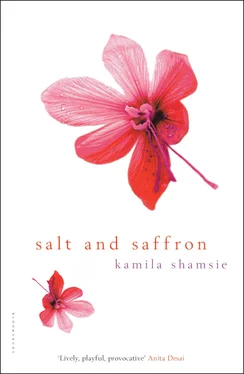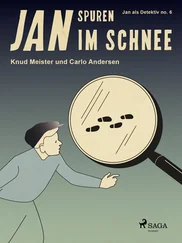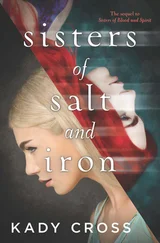‘Fariduddin was the ugly Nawab,’ I said, and everyone aahed.
So ugly that all the paintings of him show a tall, strikingly handsome man with lashes so long and luxurious you ache to run your fingers through them. Of course, the painters were all his subjects, so what do you expect? (Besides, one of the Starched Aunts noted, none of the paintings show the back of his head, and that omission must mean something.) Regardless of details, the bottom line is he was ugly, and he knew it. He knew also that his wife’s brother, Askari, was not ugly and he knew his wife knew it, too. But he didn’t realize the extent to which she knew it until she gave birth to twins. One, the spitting image of Fariduddin. One, the spitting image of Askari.
Perhaps Fariduddin had read too many Greek myths and too few biology texts. It was the middle of the eighteenth century — literature was more important than science in the education of a prince. Yes, yes, I’m referring to Leda and her twin eggs again. One egg encased the mortal children of her husband, Tyndareus; the other egg incubated the immortal children of Zeus. No one tells us what Tyndareus thought when he saw his children hatch and saw, also, that other egg from which the children of Zeus — Helen and Pollux — emerged. Let’s face it, Tyndareus could do nothing about the fact that his children, Clytemnestra and Castor, were twinned with twins who were no relation to Tyndareus. There is nothing to do against a god but rage, and quietly. But Fariduddin, having read his mythology, saw his wife’s children and knew that those twins were not-quite-twins in the way that Castor and Pollux were not-quite-twins. Except, it was no god who held Fariduddin’s wife in his beak and his wings. It was Askari who thought he could take that which was most forbidden to him and escape without detection. But Askari’s beauty — his eyes, his smile, his rose-shaped mouth — was his doom. Fariduddin saw his wife’s children, saw one who was ugly and would never be anything else, and saw another who was beautiful in the way that only one other man in the kingdom was.
Fariduddin said to his wife, ‘I will kill Askari first. Then his son. Then you.’ You’d do well to suspect the veracity of this part of the story. We’ve watched enough movies, all of us, to know that when you say a thing like that all three of your intended victims will survive, and you’ll be the one with the bullet through your heart. You see, I’m not even pretending there’s suspense attached to this bit. Did I mention that by now the Dard-e-Dils were well and truly independent of the Mughals and had their first real chance of becoming great princes, free from all overlords, enlightened rulers of a stable kingdom? Did I mention that the year was 1773? Guess which trading company in India was dealing in more than spices by now.
Yes, when Askari heard Fariduddin’s cry of rage he galloped away to a neighbouring state, where the East India Company had something between a toe- and a foot-hold. What exactly Askari said to the Englishman, Fraser, I don’t know, but he might as well have held out a silver platter with the soil of Dard-e-Dil sprinkled on it, and a gout of blood added for good measure. The rest is painfully predictable. The troops loyal to Askari, with the aid of the English, overran Dard-e-Dil. Fariduddin was killed. Askari became regent to the infant Nawab (the ugly one, who grew up to be beautiful despite all predictions). Did Askari think the English would tip their hats, collect their gold, and go? Did he think? Clearly not, because in addition to the fifty lakh rupees he paid out, he also made a treaty of mutual assistance with the English.
Were they involved, the Empire builders, in stirring up trouble for Askari? Every time the state lurched towards peace another nobleman would carve out an alliance to unseat Askari, and every time that happened Askari turned to Fraser and his men. By the time the Nawab attained his majority and Askari died in a drunken brawl at the banquet to celebrate the Nawab’s birthday, Dard-e-Dil was just another de facto vassal, and Fraser, that man of common birth, was a lord. The rest of the story? This is how the history books sum it up: ‘Near the turn of the century the state’s fiscal debt to the English was so vast the Company annexed half the lands of Dard-e-Dil in commutation of arrears.’ Half the lands. Those three syllables cannot begin to convey the orchards and rivers and mosques and temples and shrines and people, yes, there must have been people on those lands, too. I only just thought of that.
(Has anyone asked what became of Fariduddin’s wife? Fariduddin killed her. Though some say Askari killed her when she shielded her husband from Askari’s drawn sword. This, at least, is incontrovertible: she died. So much for movie rules.)
I looked up from my haleem. Touched my foot to Sameer’s for support. ‘Don’t worry about Mini Apa’s twins.’ Sameer, now with his own place setting, moved his chair a little closer to mine. ‘There’s never been more than one pair of not-quites co-existing at one time. And if that pattern holds, her twins will be fine. After all, I’m still alive and, though god help us we have no way of being sure of this, so is Mariam Apa.’
Ami tapped my cheek with a piece of naan. ‘Aliya, I love you truly-truly, so don’t take this badly, but I have no idea what you just said and why and don’t dip your sleeve in the haleem.’
‘It’s my sleeve,’ was all I could say.
‘No, Aliya, it’s mine. But it looks a lot better on you so you can have it.’
‘Just the sleeve,’ Aba said. ‘The rest of the kameez goes back to your mother’s cupboard. What’s the matter, little bug?’
So, finally, I told them about the family tree.
Aba snorted.
Ami rolled her eyes.
Dadi looked at me. And nodded. And sighed.
Aba turned to his mother. ‘Mama, don’t you dare,’ he said.
Dadi stood up in her most regal way. ‘The one thing left to us was the ability to hold our heads up high. She took even that from us. The curse has already come to pass.’ She looked at me. ‘You had no part in it. The histories teach us that the twins aren’t always directly responsible for what happens. Sometimes they are victims of others. Sometimes only one twin is responsible. Sameer, escort me to my car.’
Sameer glanced at me, and I loved him for that moment of treason. I nodded, inclined my head towards Dadi. Should I be angry with her for saying Mariam had brought a curse upon us; or should I be grateful for her declaration that I had no part in the curse? Just before she turned to walk out with Sameer, Dadi bent down and kissed the top of my head.
Aba watched her go, his expression bordering on petulance. ‘She gets worse with age.’ He threw a stick of ginger at me, his expression of paternal command restored. ‘Ignore what she said. The twin thing hits a raw nerve in her.’ He pointed at Ami. ‘Your mother didn’t want her filling your head with all of that from such an early age, but I said they’re good stories. Nothing more.’
‘Are you saying you don’t believe any of it, Aba?’
‘I don’t believe it,’ Ami said. ‘He wants not to. But he was raised on the stories, too.’
‘You and Mariam aren’t twins. Not in any sense of the word. What she did, she did. She would have done it even if you’d been born a day later.’ Aba folded and unfolded his napkin repeatedly. ‘I should have fired Masood when—’
‘Nasser!’ Ami said. ‘Be quiet.’
Sameer came back in and sat down. ‘Clones,’ he said, picking up the stick of ginger that had bounced off my shoulder, and pointing it at me. ‘Human cloning. Theoretically, it’s possible.’
‘Point?’ I said.
Читать дальше












